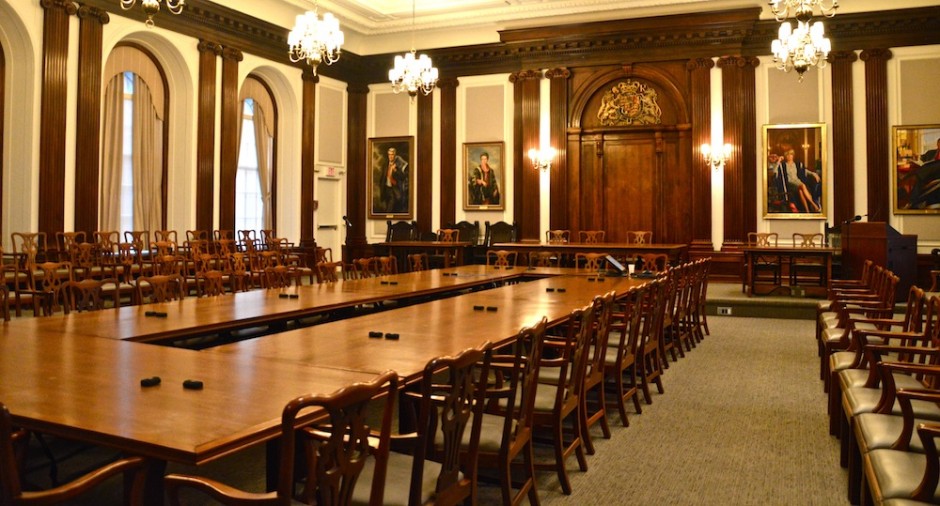ASSU’s open letter concerning the Student Societies Summit
Professor Cheryl Regehr
Vice-President and Provost
Simcoe Hall
21 King’s College Circle
Toronto, ON
CC: Professor Jill Matus, Vice-Provost, Students & First-Entry Divisions
Dear Professor Regehr,
We are writing to you today to express our concern at a number of recommendations made by the faculty who attended the Student Societies Summit this year, including the formation of a university wide Appeals Board and the requirement that all CROs in student elections be selected from a roster approved by the university.
ASSU, along with many other student societies, were invited to participate in this summit in October to resolve the disputes between the various college and faculty divisions and the UTSU. Our representative met with other student representatives and the faculty members each month and engaged in what we felt were productive discussions on student governance. While fruitful discussions occurred, none of the proposed recommendations were ever approved or substantially discussed by the summit participants.
While we recognize that these recommendations are well intended, we feel that presenting them as “conclusions of the summit” is misleading, as student representatives were never given the opportunity to consent to their approval. It is also important to recognize, that while these recommendations have implications on all student societies, some were left out of the process. The Scarborough Campus Students’ Union (SCSU), the Association of Part Time Undergraduate Students (APUS) and the Graduate Students’ Union (GSU) were not invited to participate in these discussions on policy that would ultimately affect them.
The report submitted on April 14th proposes that Governing Council enact a new policy for student societies and makes recommendations as to what might be covered in this policy.[i] The first recommendation is that “the new policy for student societies require that every society use an arms-length Chief Returning Officer (CRO) who has been appropriately certified by the University.” It goes on to stipulate that this process could work by having the student societies assign a member the responsibility to be a trained CRO for the university. After they were properly certified, they could be chosen by any society but their own to be a CRO. We find this recommendation to be problematic; as it takes away the right members of a society have to choose their CRO and the right members have to conduct their own elections. Furthermore, individuals on this roster may not be familiar with the bylaws of the organization they are chosen to oversee – since the stipulation states that they have to be totally external to the organization, and there is no guarantee that they will not come with biases of their own. The use of members assigned by other societies to serve as CROs for other societies also brings with it risks. As we have seen, the political climate amongst student societies at U of T is one that is divisive and opinionated and student societies have commented on the legitimacy and the ability of other societies to represent students. While these organizations certainly have the right to make such statements, this brings into question the neutrality of the CROs from other societies.
The next few recommendations deal with the creation of a proposed “Student Society Appeals Board” which would “serve as a court of final appeal about the conduct of student societies”.[ii] This board would be composed of students, faculty, staff and a retired judge. It would also have the power to issue binding directives to student societies, of which the consequence of non-compliance would mean the withholding of student fees. To guide these directives and the requirement that societies act in an “open, accessible and democratic fashion” it is also recommended that a set of guidelines on elections and governance be developed. [iii] The creation of such an appeals board raises many issues. First of all, the composition of such a board leaves many questions unanswered. What would the ratio of students to other members be on the board? How would the members of the board be chosen? Would they be elected or would they be appointed? What recourse do students have if they believe that one of the board members is not an appropriate selection?
The ability of such a board to deal with election grievances each March (when elections are traditionally held) is also questionable. There are dozens of student societies within U of T, ASSU alone is host to more than sixty course unions, and each of these societies brings with it a unique set of bylaws and constitutions. For the members of the board to familiarize themselves with these bylaws and constitutions in such a short amount of time with potentially multiple cases presents a challenge that may compromise the integrity of the process. The board would effectively be dealing with every appeal that was rejected by the internal appeals processes of societies. This issue does not exist within internal society appeals boards, where there is just solely one set of bylaws to look at.
The most troubling element of this recommendation is the amount of power given to the proposed board. The board can make binding directives on matters not restricted to elections, and non-compliance with these directives can be grounds for the Provost to withhold fees. As written, these directives can be based on anything and do not have to be compliant with the organization’s own by-laws.[iv] In the latter case if the board rules against a by-law, it would be a case of the board going against what was democratically agreed upon by students. Students can present grievances based on virtually any matter and the board can choose to withhold fees if it chooses to. In addition to this, the fact that the board would be “a final court of appeals” leaves no avenue for student societies to appeal, effectively forcing them to comply.
The recommendations state that in order to guide these directives, a set of guidelines should be produced by the University in order to ensure good democratic practices. These guidelines address appropriate voting technologies, the role of slates in an election, elections of board of directors and executives among other things.[v] We believe that such matters need to be addressed by student societies and discussed by their membership, not decided upon by the University. These are written out as “guidelines”, however since they would guide the binding directives the board would issue, they are effectively requirements. This is troubling, as while not all societies may use these guidelines; this does not mean that they are not operating in an “open and democratic fashion”.
Finally, when discussing the policy on student societies, the final point mentioned is that “there should be a process that allows for the restructuring of societies”. [vi] This goes beyond the traditional role university administrations have held when it comes to student societies. These decisions must be made by the student membership, even in the event of a funding freeze. The administration, if it believes societies are not acting in a democratic manner can withhold funds, however it cannot play a role in the restructuring of the society. This violates the fundamental autonomy of student societies themselves.
The University of Toronto is a diverse place where individuals of different lived experiences, come to exchange ideas and thoughts. Our students, faculty, staff and community members each have different interests, experiences and fields of study. Likewise, our student societies reflect this diversity. Student unions, course unions, college councils and clubs all operate with a different set of by-laws, have different mandates, and cater to the different needs of students. A robust policy that ensures that the democratic rights of students are being upheld respects this. In the report, there is a caution against using a “one size fit all model”, yet this is exactly what the recommendations represent.[vii] While the recommendations are primarily based off concerns students have regarding the UTSU elections, they would affect all societies. This is not an effective way to address the concerns students have raised.
The report states that the recommendations would respect student autonomy, however in practice, this is far from the case. The by-laws and rules under which student societies are structured today each came about under a democratic process where students voted to adopt these rules. The university cannot circumvent this process.
It is important to recognize that these student grievances that have been voiced over the years amount to disagreements among the student body and as such there are no clear answers for how to proceed. As such, we believe that this process needs to be carried out with due consideration for the input of student societies and without undue haste.
We recognize that the status quo is unsustainable and we agree that change is necessary, however, we believe that any change that comes through policy must respect the autonomy and diversity of student societies, as well as be constructed with the consent of said societies. These recommendations fall far short of these criteria. The problem that has arisen over the past few years with student society elections is a unique and complex one that deserves to be carefully analyzed with the input of all those involved. ASSU wishes to play a part in any policy Governing Council may shape in regards to the conduct of student societies, however, we cannot accept these recommendations for the aforementioned reasons. We look forward to working together with you, the administration and all students to formulate solutions that work for us all.
Sincerely,
The Arts and Science Students’ Union Executive
[i] “Report of the Student Societies Summit,” page 19.
[ii] “Report of the Student Societies Summit,” page 20.
[iii] “Report of the Student Societies Summit,” page 20.
[iv] “Report of the Student Societies Summit,” page 20.
[v] “Report of the Student Societies Summit,” page 21
[vi] “Report of the Student Societies Summit,” page 19.
[vii] “Report of the Student Societies Summit,” page 20.


